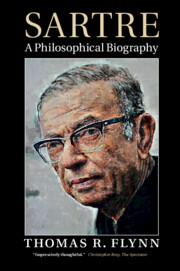Book contents
- Frontmatter
- Dedication
- Contents
- Preface
- Acknowledgments
- Abbreviations
- 1 The childhood of a genius
- 2 An elite education: student, author, soldier, teacher
- 3 Teaching in the lycée, 1931–1939
- 4 First triumph: The Imagination
- 5 Consciousness as imagination
- 6 The necessity of contingency: Nausea
- 7 The war years, 1939–1944
- 8 Bad faith in human life: Being and Nothingness
- 9 Existentialism: the fruit of liberation
- 10 Ends and means: existential ethics
- 11 Means and ends: political existentialism
- 12 A theory of history: Search for a Method
- 13 Individuals and groups: Critique of Dialectical Reason
- 14 A second ethics?
- 15 Existential biography: Flaubert and others
- Conclusion: the Sartrean imaginary, chastened but indomitable
- Select bibliography
- Index
- References
4 - First triumph: The Imagination
Published online by Cambridge University Press: 18 December 2014
- Frontmatter
- Dedication
- Contents
- Preface
- Acknowledgments
- Abbreviations
- 1 The childhood of a genius
- 2 An elite education: student, author, soldier, teacher
- 3 Teaching in the lycée, 1931–1939
- 4 First triumph: The Imagination
- 5 Consciousness as imagination
- 6 The necessity of contingency: Nausea
- 7 The war years, 1939–1944
- 8 Bad faith in human life: Being and Nothingness
- 9 Existentialism: the fruit of liberation
- 10 Ends and means: existential ethics
- 11 Means and ends: political existentialism
- 12 A theory of history: Search for a Method
- 13 Individuals and groups: Critique of Dialectical Reason
- 14 A second ethics?
- 15 Existential biography: Flaubert and others
- Conclusion: the Sartrean imaginary, chastened but indomitable
- Select bibliography
- Index
- References
Summary
Sartre is a philosopher of the imaginary. In an interview late in life, he admitted: “I believe the greatest difficulty [encountered in my research for my Flaubert study] was introducing the idea of the imaginary as the central determining factor in a person.” If one takes “imaginary” in the broad sense we have been using it, namely, as the locus of possibility, negativity and lack, articulated in creative freedom, this can be taken for an autobiographical remark as well. The tension between creative literature and philosophy, between image and concept, that he experienced as a lycée student was symptomatic of this basic feature of his thought. But that tension abated, though it did not disappear, when he turned his philosophical attention to the imagination and his literary undertakings to philosophical themes, as we noticed in Chapter 2. Recall Sartre’s remark that at this early stage he scarcely distinguished between psychology and philosophy. Though noted for his absence from classes at the Sorbonne, Sartre joined Nizan, Aron and Daniel Lagache to follow the lectures of psychologist Georges Dumas at the psychiatric hospital of Sainte-Anne. In fact, his graduation thesis for the DES was written under the direction of a distinguished professor of psychology, Henri Delacroix. His director later invited Sartre to submit a version of the text for the series he was editing for the Presses Universitaires de France. This short work, L’Imagination, became Sartre’s first book-length publication (1936). Unlike the DES thesis, where the lone reference to Hüsserl (sic) is second-hand, The Imagination awards Husserl’s thought pride of place. He is reserved for the final chapter where most, if not all, of the errors and inadequacies of the previously discussed philosophers and psychologists are set aright. This is clearly a Husserlian book, but one that bears the usual Sartrean qualifiers.
The Imagination
Between the DES thesis and the published book came the Berlin experience as well as nearly a decade of philosophical “novels” that, as we have remarked, anticipated several of the distinguishing aspects of Being and Nothingness. One can observe these and others presenting themselves in the course of Sartre’s book – which, like the next two, would be a study in philosophical psychology.
- Type
- Chapter
- Information
- SartreA Philosophical Biography, pp. 76 - 103Publisher: Cambridge University PressPrint publication year: 2014



